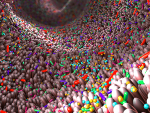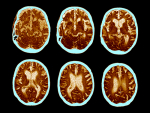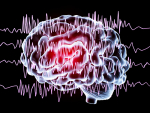Displaying items by tag: neuroscience
The UAB-led consortium, begun in 2006, has expanded to 24 clinical sites and conducted 18 clinical trials.
Tagged under
The clinic, supported by an Alabama Department of Commerce Innovation Fund grant, makes it easier for patients to get all the services they need in one place.
Tagged under
UAB pediatric neurosurgeon Jeffrey Blount co-founded the group who presented the resolution on fortification of folic acid in staple foods to the WHO.
Tagged under
UAB Neurosurgery heads to local elementary schools to encourage young students to consider the STEM fields as they ponder career choices.
Tagged under
The study, utilizing the relatively new field of metagenomics, demonstrated an imbalance in the gut microbiome of patients with Parkinson’s disease.
Tagged under
Michael Ho is the first in UAB’s history to be awarded this prestigious scholarship by AED in recognition of his scholastic achievements in academics as well as extracurriculars.
Tagged under
The AHEAD study is looking to recruit people at risk for developing Alzheimer’s disease for a new study.
Tagged under
Three UAB employees share their diabetes journey and provide healthy tips in honor of Diabetes Awareness Month.
Tagged under
An internationally recognized clinician and researcher in Parkinson’s disease, UAB’s David Standaert, M.D., Ph.D., has been honored with a lifetime achievement award from the Parkinson’s Association of Alabama.
Tagged under
The Mr. and Ms. UAB Scholarship Competition is one of UAB’s longest-standing Homecoming traditions. Each winner will receive a $2,500 scholarship and serve as an ambassador of UAB.
Tagged under
- release
- alumni
- athletics
- student affairs
- college of arts and sciences
- honors college
- school of health professions
- school of education
- neuroscience
- department of psychology
- department of theatre
- department of political science and public administration
- department of kinesiology
- minority health and health equity research center
- benevolent fund
- blazer kitchen
- collat school of business
- arts in medicine
- students
Tagged under
Carbohydrates are directly linked to the development of Type 2 diabetes, but a higher-carb diet is underused in research models.
Tagged under
The new technique to predict seizure clusters could, if confirmed, have a profound impact on patients with drug-resistant epilepsy who are prone to seizure clusters.
Tagged under
An aneurysm is a bulge in a blood vessel caused by a weakness in the blood vessel wall, resulting in an increase of pressure in a small area and causing the vessel to balloon.
Tagged under
UAB 2020 graduate Shreya Malhotra was selected as a fellow for the Knight-Hennessy Scholars, making history as the first recipient from UAB.
Tagged under
Medical professionals are calling on the World Health Assembly to pass a resolution calling for folic acid fortification in staple foods to prevent spina bifida worldwide.
Tagged under
Radiofrequency ablation precisely delivers heat energy that can destroy lesions within the brain that are the cause of seizures.
Tagged under
Five Blazers will work, live with and learn from people in their host countries during their time in the Fulbright program.
Tagged under
- release
- office of the provost for student and faculty success
- office of national and international fellowships and scholarships
- college of arts and sciences
- neuroscience
- department of political science and public administration
- department of english
- department of chemistry
- international studies
- honors college
- national and international fellowships and scholarships
With the number of Americans with dementia expected to increase dramatically, UAB’s new brain health clinics point the way to improving brain health over a lifespan.
Tagged under
Clinton Global Initiative University engages student leaders in developing innovative solutions to campus, community or global challenges.
Tagged under
- release
- office of the provost for student and faculty success
- office of service learning and undergraduate research
- college of arts and sciences
- collat school of business
- school of public health
- graduate school
- honors college
- department of physics
- neuroscience
- department of marketing industrial distribution and economics
- department of political science and public administration
- national and international fellowships and scholarships



















